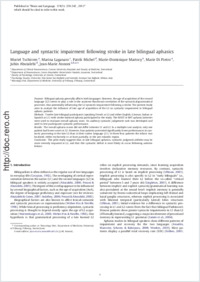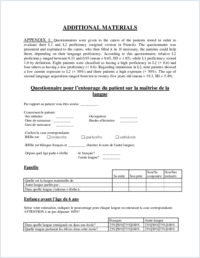Language and syntactic impairment following stroke in late bilingual aphasics
- Tschirren, Muriel Department of Clinical Neurosciences, Geneva University Hospitals and Faculty of Medicine, Switzerland
- Laganaro, Marina Faculty of Psychology, University of Geneva, Switzerland
- Michel, Patrik Psychology Faculty, University Vita-Salute San Raffaele and Scientific Institute San Raffaele, Milano, Italy
- Martory, Marie-Dominique Neurology Unit, Department of Medicine, University of Fribourg, Switzerland
- Di Pietro, Marie Department of Clinical Neurosciences, Geneva University Hospitals and Faculty of Medicine, Switzerland
- Abutalebi, Jubin Psychology Faculty, University Vita-Salute San Raffaele and Scientific Institute San Raffaele, Milano, Italy
- Annoni, Jean-Marie Department of Clinical Neurosciences, Geneva University Hospitals and Faculty of Medicine, Switzerland - Department of Neurosciences, Centre Hospitalier Universitaire Vaudois, Lausanne, Switzerland - Neurology Unit, Department of Medicine, University of Fribourg, Switzerland
-
16.06.2011
Published in:
- Brain and Language. - 2011, vol. 119, no. 3, p. 238-242
English
Purpose :Bilingual aphasia generally affects both languages. However, the age of acquisition of the second language (L2) seems to play a role in the anatomo-functional correlation of the syntactical/grammatical processes, thus potentially influencing the L2 syntactic impairment following a stroke. The present study aims to analyze the influence of late age of acquisition of the L2 on syntactic impairment in bilingual aphasic patients.Methods: Twelve late bilingual participants (speaking French as L2 and either English, German, Italian or Spanish as L1) with stroke-induced aphasia participated in the study. The MAST or BAT aphasia batteries were used to evaluate overall aphasia score. An auditory syntactic judgement task was developed and used to test participants syntactic performance.Results: The overall aphasia scores did not differ between L1 and L2. In a multiple case analysis, only one patient had lower scores in L2. However, four patients presented significantly lower performances in syntactic processing in the late L2 than in their native language (L1). In these four patients the infarct was localized, either exclusively or at least partially, in the pre-rolandic region.Conclusion: This pilot study suggests that, in late bilingual aphasics, syntactic judgment abilities may be more severely impaired in L2, and that this syntactic deficit is most likely to occur following anterior lesions.
- Faculty
- Faculté des sciences et de médecine
- Department
- Médecine 3ème année
- Language
-
- English
- Classification
- Biological sciences
- License
-
License undefined
- Identifiers
-
- RERO DOC 28044
- DOI 10.1016/j.bandl.2011.05.008
- Persistent URL
- https://folia.unifr.ch/unifr/documents/302134
Other files
Statistics
Document views: 127
File downloads:
- pdf: 427
- Supplementary material: 169

